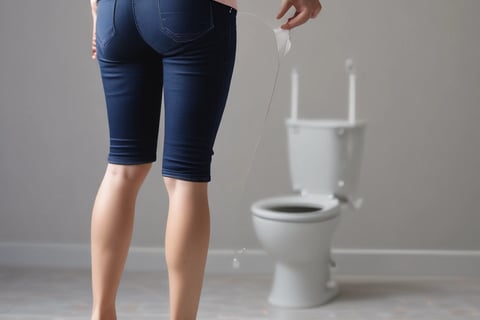Stop Bladder Leaks Naturally: How Balancing Your Urinary Microbiome Changes Everything
6/18/20255 min read
Understanding Bladder Leaks
Bladder leaks, clinically known as urinary incontinence, refer to the involuntary loss of urine, which can occur during activities such as coughing, sneezing, laughing, or even while exercising. This condition affects millions of individuals worldwide, significantly impacting their daily lives and emotional well-being. Research indicates that urinary incontinence is particularly prevalent among women, with estimates suggesting that up to 50% may experience some form of bladder leakage, especially after childbirth or during menopause. Men are also affected, particularly those with prostate issues, although the overall prevalence tends to be lower.
Several factors contribute to the onset of bladder leaks. Hormonal changes are a significant influence, as fluctuations in estrogen during menopause can weaken pelvic floor muscles, leading to increased susceptibility to urinary incontinence. Additionally, aging plays a crucial role; the bladder’s capacity and the functionality of muscles involved in urination decline over time, making leakage more likely. Certain lifestyle choices, such as obesity, smoking, and high-impact physical activities, can exacerbate the situation by increasing intra-abdominal pressure or damaging pelvic floor integrity.
The physical effects of bladder leaks extend beyond the mere inconvenience of frequent restroom visits. Individuals may experience skin irritations, urinary tract infections, and sleep disturbances due to the constant urgency to urinate. Emotionally, the condition can lead to feelings of embarrassment, anxiety, and social withdrawal, creating a negative feedback loop that further diminishes quality of life. Addressing bladder leaks through natural remedies, lifestyle modifications, and appropriate medical interventions is essential for enhancing well-being. Understanding the underlying causes of urinary incontinence is crucial for developing effective management strategies.
Available Treatments for Bladder Leaks
Bladder leaks, often characterized by involuntary loss of urine, can significantly impact the quality of life of those affected. There are several available treatments that aim to manage this condition, ranging from traditional medical therapies to surgical interventions. Understanding these options can empower individuals to make informed decisions regarding their treatment journey.
One of the most commonly recommended approaches is pelvic floor exercises, specifically Kegel exercises. These exercises strengthen the muscles that support the bladder, which can lead to improved control over urination. Commitment to regular practice can yield positive results, but it requires consistency and patience. In addition, pelvic floor physical therapy can provide guided instruction and tailored programs to enhance the effectiveness of these exercises.
Medications also play a significant role in managing bladder leaks. Anticholinergics and beta-3 adrenergic agonists are among the pharmaceuticals frequently prescribed to reduce urgency and frequency of urination. While these medications can be effective, they may cause side effects such as dry mouth or constipation. Thus, a careful discussion with a healthcare provider is essential to weigh the benefits against potential drawbacks.
For individuals seeking more definitive solutions, surgical options may be considered. Procedures include sling surgeries and neuromodulation therapies, which target the nerves controlling bladder function. While surgical options can provide relief for many, they are not without risks and require thorough evaluations to determine candidacy.
Each treatment option varies in its approach and effectiveness, and it is crucial for individuals experiencing bladder leaks to consult their healthcare providers to identify the most suitable strategy for their unique circumstances. As patients navigate these choices, they may also wish to explore emerging natural treatments aimed at balancing the urinary microbiome, an area that shows promise in addressing bladder-related issues.
Natural Solutions: The Role of the Urinary Microbiome
The urinary microbiome refers to the diverse community of microorganisms residing in the urinary tract. This complex ecosystem plays a pivotal role in maintaining bladder health, acting as a barrier against harmful pathogens while also contributing to overall urinary function. A balanced urinary microbiome can diminish the risk of bladder leaks, a condition that affects many individuals and can significantly impact quality of life. The relationship between the urinary microbiome and bladder health is emphasized by the fact that disruptions in this microbial balance often correlate with various urinary issues, including infections and incontinence.
Several factors can disrupt this delicate balance, including antibiotic use, poor dietary choices, hormonal changes, and environmental influences. The overuse of antibiotics, for example, can lead to the depletion of beneficial bacteria, allowing harmful microorganisms to flourish and potentially causing urinary tract infections (UTIs) or bladder leaks. Additionally, lifestyle factors such as high sugar consumption and insufficient hydration can also negatively affect the microbiome's health. Recognizing these factors is crucial for individuals seeking to maintain a healthy urinary environment.
Nurturing a balanced urinary microbiome is essential for enhancing bladder function and overall urinary health. One innovative approach to achieving this balance is through the use of natural products like Femipro. This product is designed to restore and support the urinary microbiome, thereby helping to alleviate symptoms associated with bladder leaks. Femipro works to re-establish the population of beneficial bacteria, ensuring that the urinary tract remains resilient against infections and other urinary troubles. By integrating Femipro into a wellness routine, individuals can adopt a proactive stance in promoting their urinary health naturally. Ultimately, understanding the role of the urinary microbiome paves the way for effective, natural solutions to address bladder leaks and improve overall quality of life.
Embracing Natural Solutions with Femipro
As we have explored throughout this blog post, natural solutions offer an effective approach to managing bladder leaks by focusing on the balance of the urinary microbiome. An imbalance in this microbiome can lead to various urinary issues, including incontinence. Thus, addressing this through natural means becomes crucial for enhancing bladder health.
One notable solution is Femipro, a product designed specifically to promote the health of the urinary microbiome. Femipro stands out due to its unique formulation that combines natural ingredients known for their beneficial effects on urinary health. By delivering essential nutrients and probiotics, Femipro works to restore the microbiome balance, potentially reducing the occurrence of bladder leaks. Incorporating this product into a daily regimen may provide users with enhanced urinary control and overall well-being.
To effectively integrate Femipro into your routine, it is recommended to follow the dosage guidelines provided on the packaging. Consistency is vital; thus, taking Femipro at the same time each day can boost its efficacy. Moreover, coupling this practice with a balanced diet rich in probiotics and hydration can further support the urinary system. Regular physical activity may also play a role in enhancing bladder function and overall health.
In conclusion, embracing a natural approach to urinary health through balanced solutions like Femipro demonstrates a proactive method for managing bladder leaks. By investing in such remedies, individuals can take significant steps towards improving their quality of life. For those interested in exploring Femipro further, please visit this link. Taking action today can pave the way for a healthier tomorrow, free from the worries of bladder leaks.






